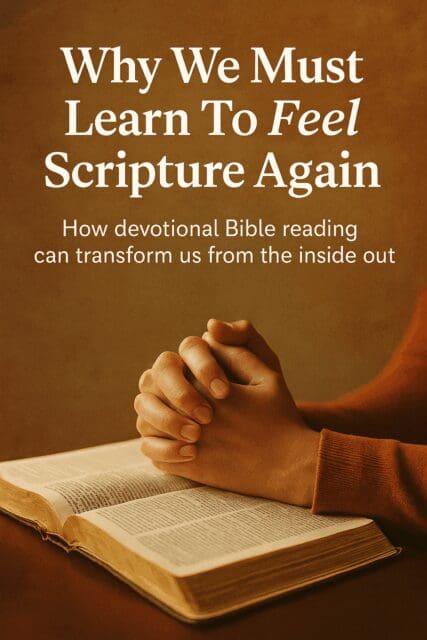The growing rate of biblical illiteracy within the Church is extremely troubling. More troubling still is that this illiteracy doesn’t come from a lack of Bible reading.
A recent Barna Group study found that 96% of born-again Christians had read the Bible in the past seven days. Yet in another Barna study, only 26% said they base their moral decision-making on biblical principles.
In other words, we’re reading Scripture — but it’s not forming us.
Many of us approach the Bible looking for anything but transformation. That’s tragic, because transformation is the very reason the written Word of God exists. Devotional reading takes discipline and consistency, but its goal is to treasure God’s Word and delight in his statutes (Psalm 119:24).
We have the revelation of God at our fingertips, yet we treat Scripture like a reference manual, a blunt tool, or a prop for our agendas — anything but a wellspring of truth meant to be savored. Devotional reading means meditating, chewing, savoring, and learning not just how to read Scripture, but how to feel it.
The Church has largely lost her ability to feel Scripture. The irony is painful: at a time when the Bible is more accessible than ever, we may be more biblically illiterate than any generation in Church history.
But this crisis creates opportunity. The Church’s discipleship culture is ripe for biblical transformation and a renewed commitment to Scripture.
Below are five ways to begin developing a greater sensitivity to Scripture. These aren’t new ideas — they’re timeless practices — but put into regular rhythms, they help us feel Scripture more deeply.
5 Ways to Feel Scripture
1. Interpret Before You Apply
Too many Bible studies begin with “What does this mean to you?” rather than “What does this passage mean?”
Jumping straight to application dulls our understanding. Modern Christianity often overestimates the need to “make the Bible relevant.”
Jesus says that following him requires denying ourselves and taking up our cross (Matthew 16:24). When we jump to application, we often reduce this to “dealing with annoyances,” instead of the passage’s true meaning: dying to self.
The Bible is already relevant. In trying to force it to fit our moment, we often miss its actual power.
Interpretation must come before application. If we want to feel Scripture, we have to let our emotions be shaped by its revelation, not force Scripture to fit our emotions.
2. Watch the Context
Verse numbers, topical sermons, and our soundbite culture all contribute to reading Scripture out of context.
Out of context, “I have not come to bring peace but a sword” (Matthew 10:34) makes Jesus sound like a warlord.
Out of context, Hebrews 6:4-6 appears to teach that believers can lose their salvation — until verse 9 clarifies the author is speaking of something other than salvation.
Short, manageable verses are helpful for memorization. But we cannot be mastered by Scripture if we never let it stretch us, challenge us, or overwhelm us.
Context protects us from misunderstanding. It forces us to drink deeply, not skim lightly.
3. Make Connections
Scripture is one unified story — a tapestry woven from the same divine thread. God is not different in the Old Testament and New. Paul did not invent a new Christianity.
One of the best things you can do in Bible study is connect your primary passage to other passages. This isn’t topical proof-texting. It’s tracing narrative, theological, and thematic connections.
For example, studying John 6 (Jesus walking on water) can connect to:
• The Spirit hovering over the waters in Genesis
• God separating land from sea
• Jesus calming the storm in another Gospel
• Israel’s complaints and manna in Exodus
• Jesus calling himself the Bread of Life
• His words about living water to the Samaritan woman
These aren’t claims that everything means the same thing everywhere, but they show how Scripture interprets Scripture.
Ask, “What does this remind me of?” Then go find the connections. This builds a fuller sense of Scripture’s unity.


